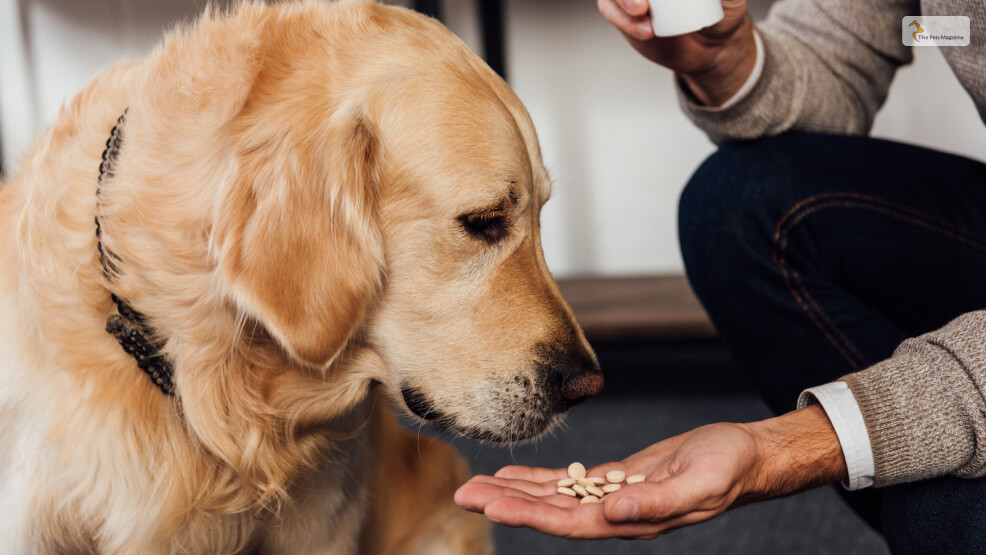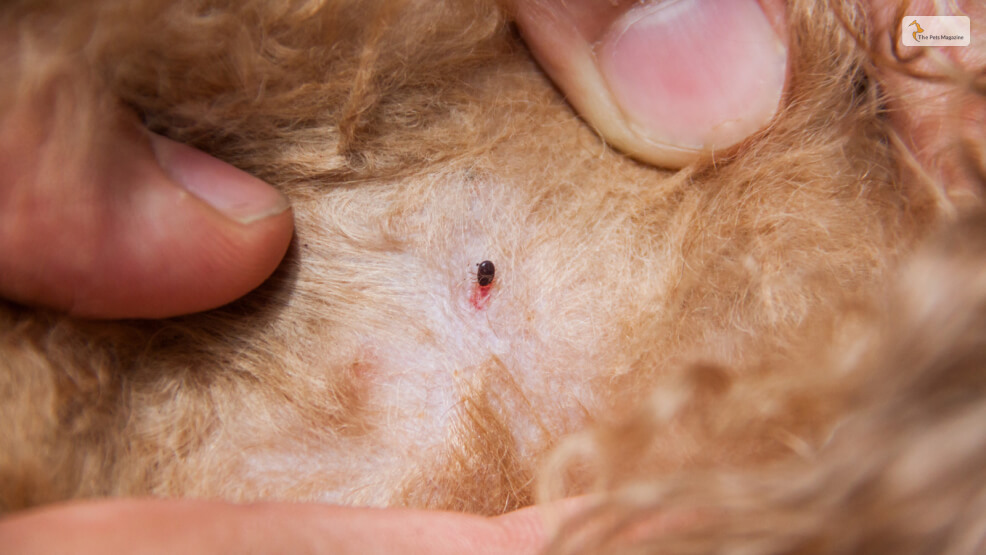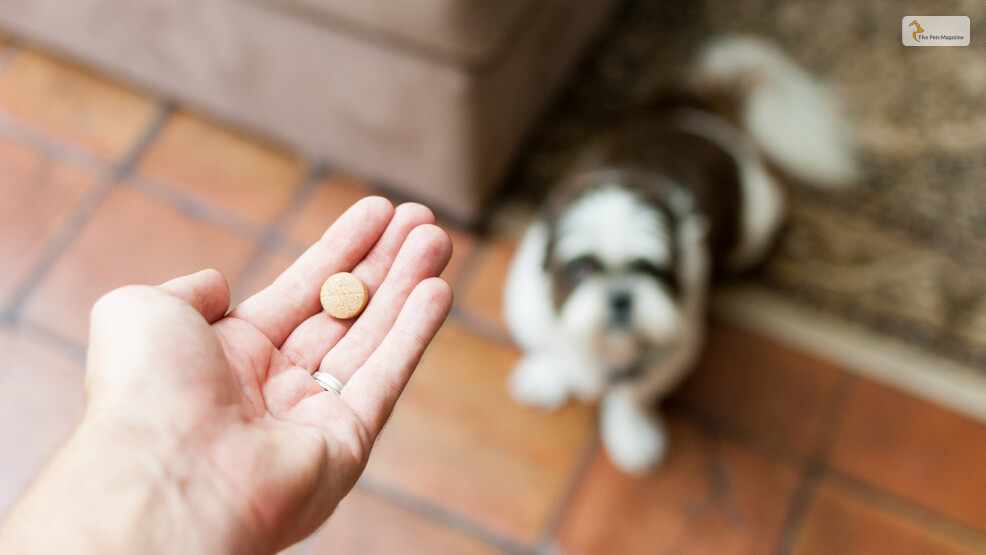Trifexis For Dogs: The Ultimate Solution For Fleas


As pet owners, we all want to ensure the best possible health for our furry friends.
However, keeping our dogs free from fleas, heartworms, and intestinal parasites can be a challenging task. These parasites not only cause discomfort to our pets, but they can also lead to serious health issues if left untreated.
Fortunately, there are various medications available in the market to prevent and treat these parasites, one of which is Trifexis. In this article, we will explore how Trifexis for dogs can be the ultimate solution for keeping your pet healthy and parasite-free.
We will delve into its benefits, dosage, administration, and safety, so you can make an informed decision about whether Trifexis is the right choice for your beloved companion.
So, let’s get started!
Understanding The Three Parasites Targeted by Trifexis
Trifexis is a powerful medication that targets three of the most common parasites that can afflict dogs: fleas, heartworms, and intestinal parasites. Understanding these parasites and the damage they can cause is crucial for any pet owner who wants to keep their dog healthy and happy.
Fleas

Fleas are perhaps the most well-known of these parasites… are perhaps the most well-known of these parasites, and they can be incredibly frustrating for pet owners. Fleas not only cause severe itching and discomfort for dogs, but they can also lead to skin infections, anemia, and even tapeworm infestations.
How Fleas Affect Dogs
Take a look at how fleabites affect dogs:
- Itching and Irritation: Fleas bite dogs, causing intense itching and irritation. This can lead to scratching, hair loss, and skin lesions.
- Allergic Reactions: Some dogs may develop allergic reactions to flea saliva, resulting in severe skin conditions like flea allergy dermatitis.
- Disease Transmission: Fleas can transmit diseases such as tapeworms, anemia, and Bartonella.
Signs of Flea Infestation
Some of the common signs of flea infestation in dogs are as follows:
- Excessive Scratching: Constant scratching is a common sign of fleas.
- Hair Loss: Fleas can cause hair loss, especially around the tail, hindquarters, and neck.
- Skin Irritations: Flea bites can lead to red bumps, scabs, and skin lesions.
- Restlessness: Infested dogs may become restless and irritable due to discomfort.
- Tiny Black Fleas or Flea Dirt: Look for tiny black specks, which are actually flea dirt (digested blood).
Heartworms
Heartworms are a much more serious threat to dogs, as they can cause significant damage to the heart and lungs if left untreated. According to the American Heartworm Society, heartworm disease is a growing problem in many parts of the United States, with up to 1 million dogs currently infected. Heartworms are spread through mosquito bites, and once a dog is infected, the worms can grow up to 12 inches long and live for up to 7 years.
How Heartworms Affect Dogs
Heartworm infection in dogs can lead to the following if it is not treated on time:
- Heart and Lung Damage: Heartworms can clog the heart and lungs, leading to reduced blood flow and oxygen intake.
- Congestive Heart Failure: Over time, heartworm infection can cause congestive heart failure, a condition where the heart is unable to pump blood effectively.
- Respiratory Distress: Heartworms can cause difficulty breathing and coughing due to their presence in the lungs.
- Sudden Death: In severe cases, heartworm infection can lead to sudden death.
Symptoms of Heartworm Infection
Some of the common signs and symptoms of heartworm infestation in dogs that you should be on the lookout for are:
- Coughing: A persistent cough is a common symptom of heartworm disease.
- Lethargy: Dogs may become lethargic or have reduced energy levels.
- Weight Loss: Despite eating normally, dogs with heartworms may experience weight loss.
- Difficulty Breathing: Shortness of breath or labored breathing can be a sign of heartworm infection.
- Abdominal Swelling: In advanced cases, fluid buildup in the abdomen (ascites) may occur.
Intestinal Parasites
Intestinal parasites, such as roundworms, hookworms, and whipworms, can also cause significant damage to a dog’s health.
Hookworms in Dogs
Hookworms are parasitic roundworms that infect the small intestine of dogs. These worms attach to the intestinal wall, feeding on blood and causing a variety of health problems.
How Hookworms Affect Dogs
Hookworm infestation in dogs can cause quite a lot of damage such as:
- Blood Loss: Hookworms can cause significant blood loss, leading to anemia and weakness.
- Diarrhea: Infection with hookworms often results in diarrhea, which can be bloody or contain mucus.
- Vomiting: Dogs with hookworms may experience vomiting, especially if the infestation is severe.
- Weight Loss: Loss of appetite and chronic diarrhea can lead to weight loss.
- Growth Retardation: In puppies, hookworm infections can interfere with growth and development.
- Secondary Infections: Hookworm infections can weaken the immune system, making dogs more susceptible to secondary bacterial or viral infections.
Symptoms of Hookworm Infection
Some of the telltale signs and symptoms of hookworm infection in dogs are:
- Pale Gums: Anemia caused by blood loss can lead to pale gums.
- Lethargy: Dogs with hookworms may become lethargic or have reduced energy levels.
- Poor Coat Condition: A dull, dry coat can be a sign of anemia.
- Abdominal Pain: Hookworms can cause abdominal discomfort or pain.
- Poor Growth: In puppies, hookworm infections can hinder growth and development.
Roundworms in dogs
Roundworms are parasitic roundworms that infect the small intestine of dogs. These worms can cause a variety of health problems, especially in puppies.
How Roundworms Affect Dogs
Roundworms can cause a lot of damage ranging from minor to serious cases such as:
- Diarrhea: Roundworms can cause diarrhea, which may be bloody or contain mucus.
- Vomiting: Dogs with roundworm infections may experience vomiting, especially in puppies.
- Weight Loss: Loss of appetite and chronic diarrhea can lead to weight loss.
- Growth Retardation: In puppies, roundworm infections can interfere with growth and development.
- Abdominal Pain: Roundworms can cause abdominal discomfort or pain.
- Intestinal Obstruction: In severe cases, roundworms can cause intestinal obstruction, a life-threatening condition.
Symptoms of Roundworm Infection
If you see the following symptoms, you should take them to the vet immediately:
- Lethargy: Dogs with roundworms may become lethargic or have reduced energy levels.
- Poor Coat Condition: A dull, dry coat can be a sign of roundworm infection.
- Abdominal Swelling: In severe cases, roundworms can cause the abdomen to become swollen.
- Worms in Feces: You may notice roundworms in your dog’s feces, although they may be difficult to see.
Whipworms in dogs
Whipworms are parasitic roundworms that infect the large intestine of dogs. These worms can cause a variety of health problems, especially in puppies.
How Whipworms Affect Dogs
Some of how whipworm can affect dogs are:
- Diarrhea: Whipworms can cause chronic diarrhea, which may be bloody or contain mucus.
- Weight Loss: Loss of appetite and chronic diarrhea can lead to weight loss.
- Abdominal Pain: Whipworms can cause abdominal discomfort or pain.
- Poor Coat Condition: A dull, dry coat can be a sign of whipworm infection.
- Anemia: In severe cases, whipworms can cause anemia due to blood loss.
Symptoms of Whipworm Infection
If you notice any one or all the signs listed below, you should take actions immediately:
- Lethargy: Dogs with whipworms may become lethargic or have reduced energy levels.
- Abdominal Swelling: In severe cases, whipworms can cause the abdomen to become swollen.
- Worms in Feces: You may notice whipworms in your dog’s feces, although they may be difficult to see.
How Trifexis Works: The Science Behind The Medication
Trifexis contains two active ingredients: spinosad and milbemycin oxime. Spinosad works by targeting the nervous system of fleas, which causes them to become paralyzed and die. Milbemycin oxime, on the other hand, works by interfering with the nerve impulses that heartworms and other parasites need to survive, ultimately causing their death.
Studies have shown that Trifexis is highly effective at preventing fleas, heartworms, and intestinal parasites. According to a study published in PubMed, the efficacy of spinosad and milbemycin oxime against an existing flea infestation was 100%, both at 24 and 48-hour intervals.
The speed at which Trifexis works is another benefit of the medication. Studies have shown that Trifexis can start killing fleas in just 30 minutes, and it can kill 100% of fleas within four hours. The medication also works quickly to prevent heartworm disease, with studies showing that it can start killing heartworm larvae within 30 minutes of being ingested.
Benefits Of Trifexis: Convenience, Efficacy, And Cost-Effectiveness

Trifexis is a popular choice for many dog owners due to its numerous benefits, including convenience, efficacy, and cost-effectiveness. It offers a simple, once-a-month dosing regimen that is easy to follow and can provide long-lasting protection for dogs against fleas, heartworms, and intestinal parasites.
In terms of efficacy, it has been extensively studied and found to be highly effective in preventing and treating these common parasites. Trifexis is also cost-effective compared to purchasing individual medications for each type of parasite. It is a single medication that can provide comprehensive protection against fleas, heartworms, and intestinal parasites, saving pet owners time and money in the long run.
For pet owners looking to purchase Trifexis for dogs, PetCareRx might be a good choice. As a certified online pet pharmacy, PetCareRx offers a wide range of pet supplies and prescription medications, including Trifexis.
They provide excellent quality products with great discounts on many items, making it an affordable option for pet owners. The pharmacy is committed to providing excellent customer service and ensuring that pet owners have access to the medications and supplies they need to keep their pets healthy and happy.
Is Trifexis Safe For Dogs? Examining Potential Side Effects

As with any medication, Trifexis can potentially cause side effects in some dogs. However, the medication is generally considered to be safe and well-tolerated by most dogs.
Some of the most commonly reported side effects of Trifexis include vomiting, diarrhea, lethargy, and loss of appetite. In rare cases, dogs may experience more serious side effects, such as seizures or allergic reactions. However, these more serious side effects are rare and occur in less than 1% of dogs treated with Trifexis.
It’s worth noting that Trifexis has been extensively studied for safety and efficacy. In one study designed to evaluate the safety of Trifexis in the treatment of flea infestations, it was found that the medication was well-tolerated by most dogs, with only a small percentage experiencing any adverse reactions.
Pet owners should always consult with their veterinarian before starting their dog on any new medication and should closely monitor their dog for any signs of adverse reactions.
Conclusion
This article has explored the various benefits of Trifexis, as well as examined the science behind how it works and its potential side effects.
By reading this article, pet owners will have a better understanding of the importance of flea, heartworm, and intestinal parasite prevention for their dogs and how Trifexis can provide comprehensive protection against these common parasites.
Read Also..








Leave A Comment